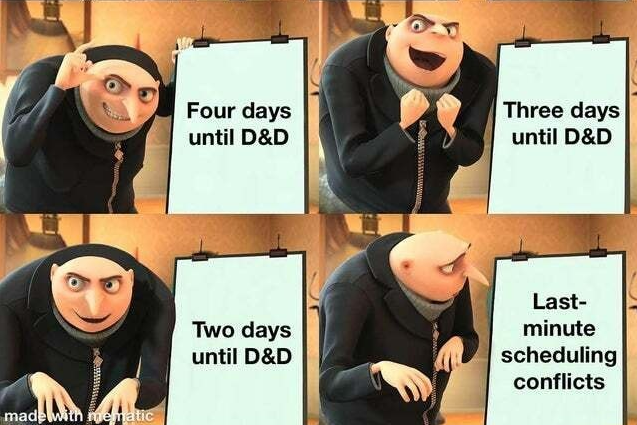Or, Scheduling D&D is a Nightmare
I will take every available opportunity to talk about Dungeons & Dragons, so today we’re going to look at a little in-game kerfuffle that serves as a case study for a situation I encounter often as an Instructional Designer. It concerns perhaps the greatest trial any D&D group faces when playing- No, not the evil lich Vecna. I’m talking about scheduling.
My group is comprised of three Android users, two iPhone users, and two people who look at their phones as little as possible. I’ve taken on the role of the long-suffering DM, also known as the person who runs the game, designs the world, hosts, and wrangles everyone into committing to a time and date when we can play. Syncing up our calendars can be… a bit of a mess. After our third unsuccessful attempt to find a session date, one of my players had the bright idea to get us all synced using an online calendar or third-party app. The conversation went as follows.
Player A: “…I assumed everyone had a virtual calendar they used to manage life 😛 I know there’s websites that can help find a common opening schedule.
Player B: “I mostly manage life with a pile of alarms and reminders on my phone”
Myself (the DM): “Generally if you have to teach people to use a new tool/website it becomes a new skill to manage instead of an aid that makes life easier. If that IS something people are interested in, we can look into it?”
My D&D chat, September 2020
I should say, as this is my close friend group, I was allowed to be a bit less-than-professional. The language above is very casual, and doesn’t contain quite the same validations and thank-you-for-your-innovative-suggestions that it might if I were speaking in a business setting. Still, the result is the same. Despite my cautions, my players all assured me that they would indeed commit to using whatever calendar tool I found, that THIS was surely the answer to all of our scheduling problems. I kept my thoughts to myself (no one likes hearing predictions of failure) and dutifully got to searching. I found the family calendar tool Cozi, a web-based collaborative calendar. Sure enough, this worked for about 6 days:
- One user (the one who initially suggested a third-party calendar) instantly connected to their iCal and uploaded their schedule
- The other two connected after several tries and screenshots
- The other players forgot to sign up and connect.
As it became clear the other players weren’t going to make the time to share to the site, the other three users began to forget to sync their calendars, which has to be done manually if you don’t have the premium service. It was becoming clear that the group wasn’t going to adopt it as our solution (and I wasn’t about to play the enforcement role here- after all, this is for fun during our free time, I’m not managing these people). It was time to re-attempt scheduling on our own.
Remember how I said no one likes hearing predictions of failure? Well, no one likes hearing “I told you so” either. So I found myself rather stuck. I didn’t want to risk alienating my players by accusing them of not using the tool. I could have tried to stop the group from trying this tool in the first place, of course. But if I hadn’t let the players experience the failure for themselves, I’d be accused of not being supportive of my players’ ideas; a DM has to be very careful to not be seen as a dictator, since we control so much of the game environment. However, now that we’d wasted two weeks on trying to schedule through this new tool, it was time to re-attempt scheduling on our own.
This is such a apt case study for the problems Instructional Designers face when new tools are pitched as solutions. If we try to stop associates from trying new tools or processes, we’re not seen as team players. Do it enough times, and people start to think we shoot down ideas. Come in after a failure with an “I Told You So,” and we’re asked why we didn’t speak up sooner. It’s a catch-22. I’ve managed to skate under the radar a few times by whipping out a ready solution upon a failure, but my discerning manager saw me do it enough times that eventually he learned to ask why I had those ready to go.

And yes, perhaps I could have called a separate session to help my players learn how to use the tool, or written up a guide on using the tool that my players could have downloaded and referenced alongside their character sheets but… come on, does that sound like it’d be any fun? Introducing and learning to use a new tool becomes its own learning objective, and while it can prove to be useful if the entire organization is behind it… Often, it ends up distracting from the problem we’re actually trying to solve. Just like in my D&D game, the Instructional Designer can land in a field of social land mines if we’re not careful. I had to work around the party abandoning the scheduling tool, without actually mentioning it, so I could tactfully just let engagement with the tool die off.
“Perception is reality” was a common aphorism around my old workplace, but when you try to mind-read for your coworkers’ reactions, you end up in a damned-if-you-do, damned-if-you-don’t situation. Instead, it’s important for a company and an ID’s direct managers to be the mediators between IDs and everyone else, and to champion their employees’ cause. Because as much as we try to facilitate change, or save people from their own ideas, we need something important from our stakeholders before we can do any of that. We need to be trusted.

